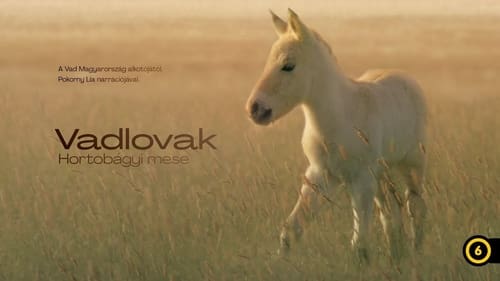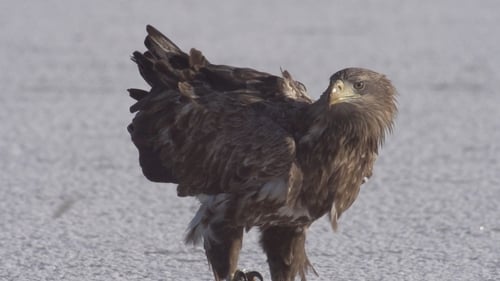
Editor

Cinematography

Director

Cinematography
Meet Dot, the little wild horse foal. She is a Przewalski's horse: the only true wild horse species of the world. Although the origin of this endangered species is in Mongolia, Dot lives in the heart of Europe, on the grassy plains of Hungary called the "Puszta". 25 years ago some were introduced here and the horses instantly formed an organic connection with this magical land with rich and unique wildlife. Today this is one of the largest Przewalski's horse herds on the planet. This is their story.

Cinematography
A new nature documentary created by Szabolcs Mosonyi and Erika Bagladi, the makers of Vad Balaton, Vad Kunság and Vad Szigetköz. Breathtaking sequences reveal the river valleys, deep canyons, sunlit crags, misty hillsides and rich wildlife of the North Hungarian Mid-Mountains. The spectacular, widescreen documentary filmed with special techniques (e.g. 4K) introduces the diverse flora and fauna of the North Hungarian forests from the ground to the canopy, in the most intimate ways and uncommon situations.

Director
A new nature documentary created by Szabolcs Mosonyi and Erika Bagladi, the makers of Vad Balaton, Vad Kunság and Vad Szigetköz. Breathtaking sequences reveal the river valleys, deep canyons, sunlit crags, misty hillsides and rich wildlife of the North Hungarian Mid-Mountains. The spectacular, widescreen documentary filmed with special techniques (e.g. 4K) introduces the diverse flora and fauna of the North Hungarian forests from the ground to the canopy, in the most intimate ways and uncommon situations.

Cinematography
The Balaton is the biggest shallow water lake in Central Europe. Although vacationers invade its coast every summer, the lake and its surroundings contain almost unbelievable natural treasures. The volcanoes, caves, tufaceous limestone stairs, sandhills and valleys are parts of the European Geopark Network, the moors are water habitats of international significance. Ground squirrels, wildcats, peregrines, ravens, mass-nesting egrets and herons, filber mice going on night adventures, asps doing wedding dance live here. The odd marriage of geology, wildlife and humans created this spectacular landscape.

Director
The Balaton is the biggest shallow water lake in Central Europe. Although vacationers invade its coast every summer, the lake and its surroundings contain almost unbelievable natural treasures. The volcanoes, caves, tufaceous limestone stairs, sandhills and valleys are parts of the European Geopark Network, the moors are water habitats of international significance. Ground squirrels, wildcats, peregrines, ravens, mass-nesting egrets and herons, filber mice going on night adventures, asps doing wedding dance live here. The odd marriage of geology, wildlife and humans created this spectacular landscape.

Cinematography
Not far from Budapest, in the outskirts of Táborfalva, a board stops the arriving: "Keep out! Entry is dangerous and forbidden!" The Forbidden Zone starts here, the second biggest shooting and drill ground in Hungary, where military field exercises have been performed for one and a half century. In spite of the danger and prohibition, the area is densely populated. Many plant and animals species live their secret lives here, some of them being rare creatures that almost completely disappeared from the cultivated parts of the Hungarian Alföld. They are protected by weapons...

Director
Not far from Budapest, in the outskirts of Táborfalva, a board stops the arriving: "Keep out! Entry is dangerous and forbidden!" The Forbidden Zone starts here, the second biggest shooting and drill ground in Hungary, where military field exercises have been performed for one and a half century. In spite of the danger and prohibition, the area is densely populated. Many plant and animals species live their secret lives here, some of them being rare creatures that almost completely disappeared from the cultivated parts of the Hungarian Alföld. They are protected by weapons...

Cinematography
Entre el Tisza y el Danubio se encuentra la Gran Llanura húngara. Al drenar los pantanos y reconducir los ríos se produjo un enorme cambio. Casi todo el curso del río Danubio fue reconducido, pero se respetó la forma de algunos meandros que aún mantienen su trazado.

Director
Entre el Tisza y el Danubio se encuentra la Gran Llanura húngara. Al drenar los pantanos y reconducir los ríos se produjo un enorme cambio. Casi todo el curso del río Danubio fue reconducido, pero se respetó la forma de algunos meandros que aún mantienen su trazado.

Cinematography
We're at Hungary's western gateway. The landscape is ruled by the representatives of economy: motorways, cities, industrial parks, wind farms, as well as the hydroelectric power plant commissioned exactly 20 years ago. But something hides among them. A giant alluvial fan with small, island-like villages, forests, wetland fields, reed beds, all of which are encircled by countless small and big watercourses and prongs. This inland delta is unique in Europe, and was created by the Danube coming out of the mountains. But today the river is not as free to move as once. Seeing the grip of the built environment, the question arises: Can the wildlife retain its former richness and beauty?

Director
We're at Hungary's western gateway. The landscape is ruled by the representatives of economy: motorways, cities, industrial parks, wind farms, as well as the hydroelectric power plant commissioned exactly 20 years ago. But something hides among them. A giant alluvial fan with small, island-like villages, forests, wetland fields, reed beds, all of which are encircled by countless small and big watercourses and prongs. This inland delta is unique in Europe, and was created by the Danube coming out of the mountains. But today the river is not as free to move as once. Seeing the grip of the built environment, the question arises: Can the wildlife retain its former richness and beauty?

Cinematography
Hungría es, probablemente, el país de Europa más influenciado por el ritmo cambiante de sus ríos. A lo largo de su historia, sus habitantes han aprendido a lidiar con inundaciones y sequías. Al este del país está la Puszta, la gran llanura húngara, un lugar en el que el pastoreo de ganado vacuno y caballar está en plena vigencia. Es también el hogar del águila de cola blanca. El centro del país está marcado por el Danubio, un ecosistema de humedales y bosques en el que proliferan ciervos, nutrias, un gran número de aves y dos peces curiosos, el siluro y una especie de carpa llamada aspio. Al oeste podemos encontrar el lago Balatón, el más grande de Europa Central, un lugar idílico para muchas aves. Ejn este documental se muestra el lado más salvaje de Hungría, un paraíso natural que se modula en torno a la cadencia voluble de sus aguas.











